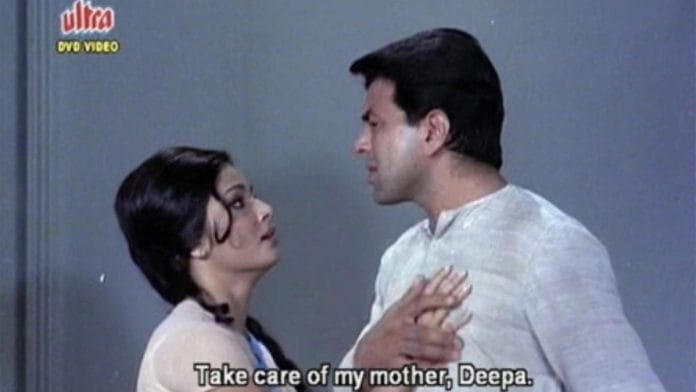Jhillmil Sitaron Ka Aangan Hoga is an evergreen song but only a few from today’s generation can name the movie it belongs to. Some songs exceed the popularity of the film and some, despite carrying superb performances by the star, rarely find mention as their biggest works. Released in 1970, Jeevan Mrityu is one such Dharmendra movie that rarely pops up in the minds of cinephiles.
The film was a thriller produced by Tarachand Barjatya, a break from the ‘clean’ family entertainers that the production house was then known for. Jeevan Mrityu was a remake of a 1967 Bengali movie Jiban Mrityu that starred Uttam Kumar and Supriya Devi. The concept is borrowed from the 19th-century English novel The Count Of Monte Cristo by Alexandre Dumas and Auguste Maquet. The movie was dubbed in Malayalam too, and it ran for 100 weeks.
In the 1970s India, corruption was a prominent social evil and the makers of Jeevan Mrityu used this theme appropriately to evoke audience emotion.
Dumas’ novel has had more than 10 adaptations in Hollywood. Revenge sagas were popular in the 70s, with Sholay (1975), Deewar (1975), and Trishul (1978) becoming cult classics. Jeevan Mrityu was less dramatic, without any item song or extended action sequences.
The film created a buzz due to the Dharmendra-Rakhee pair. It was also Rakhee’s debut Hindu film. It had Dharmendra donning a turban, as a disguise—the first time he had played a Sardar in his career. After the success of Jeevan Mrityu, Rakhee was paired opposite Dharmendra in another thriller, Blackmail (1973), directed by Vijay Anand. It was also a commercial success.
Revenge tale
In the film, Dharmendra plays Ashok Tandon, a young aspiring graduate who joins a bank as a probationary officer. His life is on track, with a new job and a supportive girlfriend Deepa (Rakhee).
But the hard-working Ashok is framed by colleagues, who want to make a quick buck. Ashok, whose career had seen rapid growth from being a probationary officer to the manager at Citizen bank, is proved quilty for embezzling funds. He ends up in jail sentence. Upon release, he realises that his girlfriend has married someone else.
When alerted by a former bank colleague of the conspiracy, Ashok decides to exact his revenge. Helped by a good Samaritan, he assumes the identity of a Sikh entrepreneur Bikram Singh, and plots his revenge against the guilty Harish (Ajit), Jagat Narain (Kanhaiyalal), barrister Amarnath (Ramesh Deo) and Ramakant (Krishan Dhawan).
Also read: A courtesan without shame or guilt—1966 film ‘Amrapali’ gave us a proud, powerful heroine
Yellow lucky shirt
In Jeevan Mrityu, Dharmendra transforms from a carefree, hopeful young man into a lost soul before finding his purpose through revenge. The character gives the actor a full range to evolve and Dharmendra has delivered every bit of it.
In an interview, Dharmendra had shared that Tarachand Barjatya had urged him to watch Uttam Kumar’s performance in the Bengali film. But Dharmendra refused, stating that would prove to be an impediment in his performance.
The film had just three songs, two of which were versions of Jhilmil Sitaron Ka Aangan Hoga. The happy version, where Ashok and Deepa dream of their future, is sung by Lata Mangeshkar and Mohammad Rafi. Another one, which appears almost in the end of the film, signalling the coming together of the two star-crossed lovers after all the misunderstandings, just has Lata Mangeshkar’s voice. She also sang the classic thumri song, Zamane Mein Aji, which forms the backdrop against which Ashok, disguised as Bikram, ensnares one of his ‘victims’.
Dharmendra also reportedly wore his ‘lucky’ yellow shirt for Jhiilmil Sitaron Ka Aangan Hoga, which he had previously worn in Mere Humdum Mere Dost (1968) and Aya Sawan Jhoom Ke (1969). Lucky shirt or not, the song was extremely popular, and the movie became his third hit.
(Edited by Ratan Priya)






